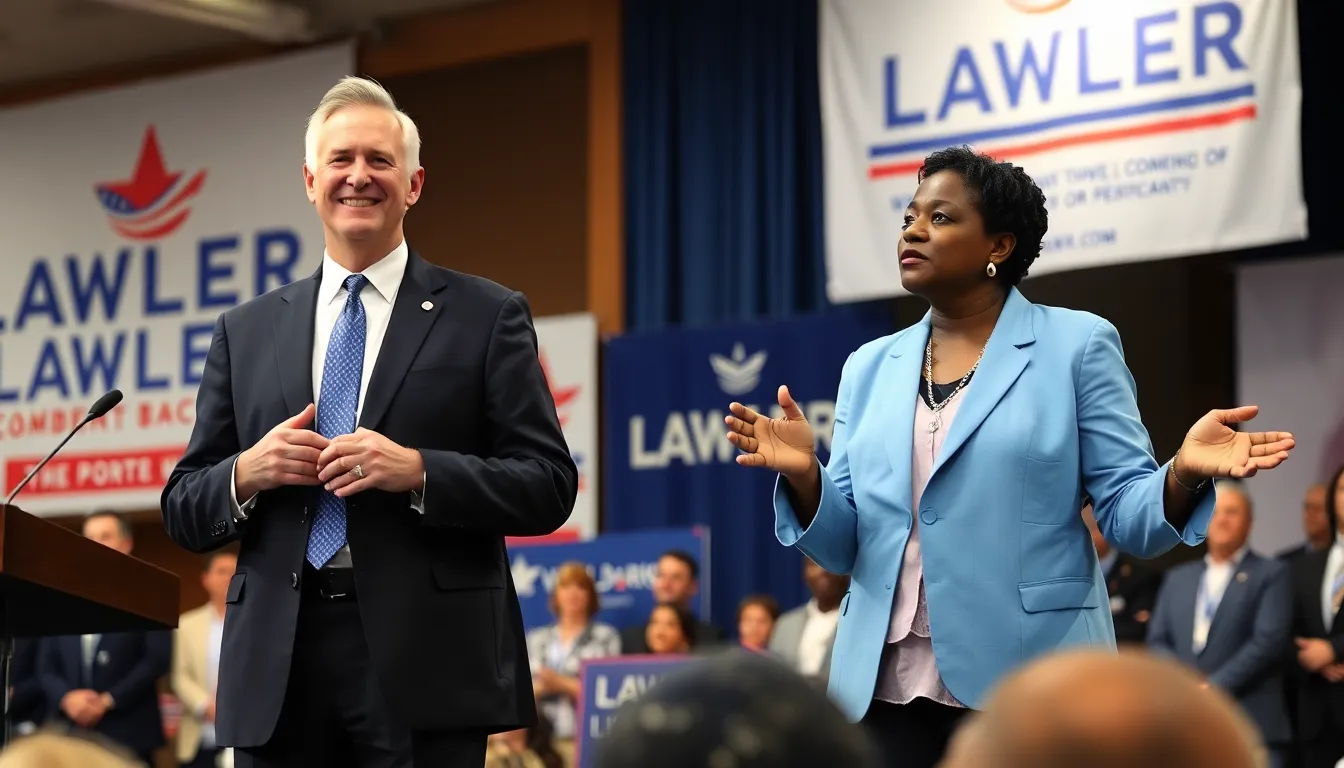The political landscape of New York has been heating up as Mike Lawler and Mondaire Jones face off in a high-stakes battle for congressional supremacy. Both candidates bring unique perspectives and compelling narratives to the table, making this race one to watch. Lawler, a Republican, emphasizes fiscal responsibility and local issues, while Jones, a Democrat, champions progressive values and social justice.
As the election approaches, voters are eager to understand the candidates’ positions on key issues that impact their communities. This matchup not only reflects the broader national political divide but also highlights the shifting dynamics within New York’s electorate. With debates, campaign strategies, and voter turnout playing crucial roles, the outcome could significantly influence the future of the state’s representation in Congress.
Table of Contents
ToggleOverview of the Debate
The debate between Mike Lawler and Mondaire Jones showcases the contrasting political philosophies that define their campaigns. Lawler emphasizes fiscal responsibility, aiming to address local economic issues, while advocating for lower taxes and reduced government spending. He addresses constituents’ concerns about the cost of living and seeks to foster economic growth through business-friendly policies.
Conversely, Jones champions progressive values, focusing on social justice, healthcare reform, and environmental sustainability. He supports increased funding for education and advocates for comprehensive measures to combat climate change. Jones argues that government intervention is essential in ensuring equity and opportunity for marginalized communities.
Both candidates articulate their visions differently, reflecting distinct strategies to engage voters in New York’s evolving political landscape. The debates highlight contrasting views on the role of government, economic management, and social policies, underscoring the critical choice voters face in the upcoming election. Understanding these differences is imperative as they could shape New York’s representation in Congress and the broader national political climate.
Background of the Candidates

The competitive race between Mike Lawler and Mondaire Jones showcases two distinct profiles and political stances reflecting their party affiliations and constituents’ concerns.
Mike Lawler: Profile and Political Stance
Mike Lawler represents the Republican Party. He serves in the New York State Assembly and has experience in local government, focusing on fiscal responsibility and economic development. Lawler’s political stance prioritizes lower taxes, reduced government spending, and business-friendly policies. He emphasizes addressing constituents’ concerns regarding the cost of living. Lawler advocates for practical solutions, aiming to ease the financial burden on families and stimulate local job growth.
Mondaire Jones: Profile and Political Stance
Mondaire Jones, a Democrat, previously served in the U.S. House of Representatives. He identifies as a progressive leader committed to social justice and systemic reform. Jones champions healthcare reform, environmental sustainability, and increased funding for education. His political stance asserts that government intervention plays a crucial role in promoting equity and ensuring opportunities for marginalized communities. Jones focuses on creating a fair society, advocating for policies that address systemic inequalities.
Key Issues in the Campaign
The campaign between Mike Lawler and Mondaire Jones centers on several key issues that resonate with New York’s voters. Their differing ideologies shape their approaches to economic policies, social justice, and environmental concerns.
Economic Policies
Mike Lawler champions fiscal responsibility and advocates for lower taxes and reduced government spending. He prioritizes addressing constituents’ economic concerns, focusing on stabilizing the cost of living and fostering a business-friendly environment. He supports local economic initiatives aimed at job creation and believes that reducing financial burdens on businesses stimulates growth. Conversely, Mondaire Jones emphasizes a progressive approach to economic issues, arguing for increased investments in public services and education. He contends that equitable economic opportunities require enhanced funding for programs that support marginalized communities and promote economic mobility.
Social Justice Initiatives
Mondaire Jones positions social justice at the forefront of his campaign, pushing for comprehensive reforms in healthcare and education. He advocates for universal healthcare as a human right and seeks to address inequities in access and quality, especially among marginalized groups. Additionally, he calls for criminal justice reform to combat systemic racism and promote equitable treatment. In contrast, Mike Lawler takes a more cautious stance, focusing on community safety and law enforcement support. While he acknowledges the need for reforms, he stresses balancing safety with accountability, advocating for policies that uphold both law and social equity.
Environmental Concerns
Environmental issues play a critical role in distinguishing the candidates’ platforms. Mondaire Jones strongly supports aggressive climate action and policies aimed at sustainability, promoting renewable energy initiatives and stricter regulations on pollution. He believes that environmental policy must focus on long-term sustainability and protect vulnerable communities most affected by climate change. Mike Lawler, while recognizing the importance of environmental stewardship, emphasizes practical solutions that consider economic impacts. He advocates for energy policies that promote energy independence and support local businesses while encouraging innovative approaches to balancing environmental responsibilities with economic growth.
Election Outcomes and Voter Reactions
The election results between Mike Lawler and Mondaire Jones reflect a deeply divided electorate, showcasing varying voter sentiments across demographics. Voter reactions emphasize the candidates’ contrasting messages and the issues that resonated most with constituents.
Voter Demographics
Voter demographics played a crucial role in the election. Young voters, particularly those in urban areas, showed strong support for Jones, aligning with his progressive policies on social justice and environmental sustainability. In contrast, older voters and those from suburban regions leaned toward Lawler, favoring his focus on fiscal responsibility and local economic growth.
Key demographic groups included:
- Age: Younger individuals aged 18-29 predominantly backed Jones, while Lawler found favor among voters aged 50 and above.
- Race and Ethnicity: Jones garnered significant support from communities of color, reflecting his emphasis on equity. Lawler appealed more to white voters, especially in more conservative districts.
- Income Levels: Voters with higher incomes tended to support Lawler, viewing his policies as beneficial for business and individual financial stability, whereas lower-income voters favored Jones for his advocacy of increased public services and support.
Key Takeaways from Exit Polls
Exit polls provided valuable insights into voter attitudes and preferences. Findings indicate:
- Top Issues: The economy emerged as the primary concern, with 45% of voters citing it as their main issue. Social justice and healthcare reform followed closely, with 30% and 25% of voters respectively highlighting these topics.
- Candidate Favorability: Jones achieved a 57% favorability rating among respondents who prioritized climate action, while Lawler secured a 60% favorability among those concerned with economic policies.
- Party Affiliation: Significant partisan divides were evident, with 85% of Democrats voting for Jones and 80% of Republicans supporting Lawler. Independents leaned slightly towards Lawler, emphasizing his appeal among a broader electorate.
Voter reactions underscored the deepening political landscape and the importance of addressing key issues that affect constituents in future elections.
The race between Mike Lawler and Mondaire Jones highlights the stark contrasts in political ideology and priorities that define today’s electoral landscape. With Lawler’s focus on fiscal responsibility and economic growth, he appeals to voters concerned about the cost of living and job creation. Meanwhile, Jones champions progressive values aimed at social equity and environmental sustainability, resonating with younger voters and those advocating for systemic change.
As the election unfolds, the implications of these differing approaches will shape not just the candidates’ futures but also the broader political climate in New York. Voter turnout and engagement will ultimately determine which vision prevails, making this a pivotal moment for constituents seeking representation that aligns with their values and needs.



